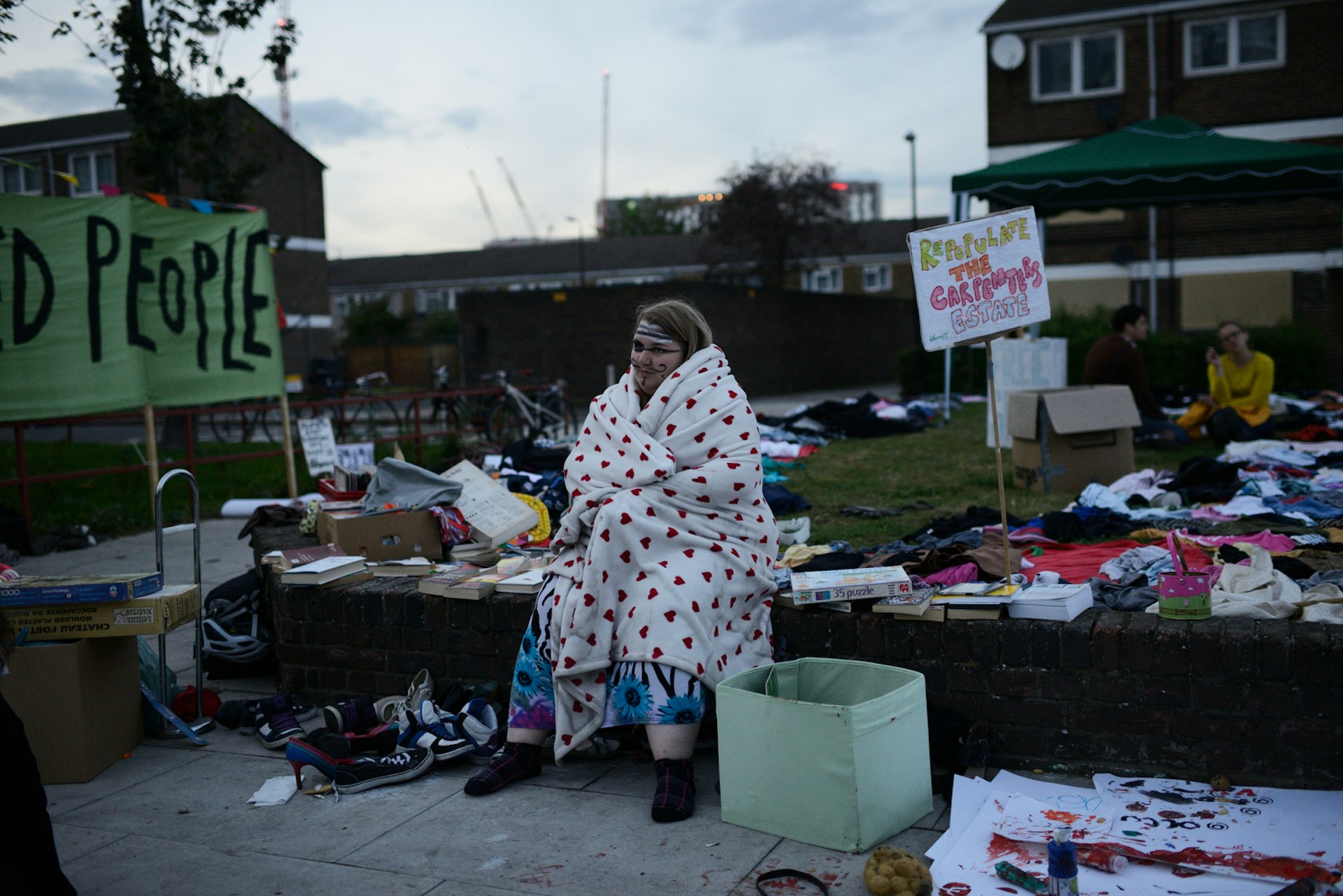
Meet the single mums fighting for your right to an affordable home
- Text by Heydon Prowse
- Photography by Shannon Jensen
I’m typing this article in the back of a VW Golf, en route to buy some fireworks, and sandwiched between two mouthy ladies – fourteen-year-old Saffron and three-year-old Sapphire. The mouthier of the two, Sapphire, is screaming, “Mummy!” while pointing at an article on my laptop screen about the Focus E15 squat on the Carpenters Estate in Newham, east London. ‘Mummy’ is twenty-year-old Jasmine Stone, one of twenty-nine single mothers who were evicted from Focus E15, the largest hostel for homeless young people in London. The hostel used to provide education in literacy, parenting, and life and work skills – so kind of important stuff – before welfare cuts slashed its services.
In the front seat is Sam Middleton, another one of the evicted mothers. Sam, also twenty, tells me that the most vulnerable tenants were evicted first as they were seen as the least likely to put up a fight.
“They got that one wrong,” she laughs.

Two years on and after a long-fought campaign of petitions and demonstrations, Jasmine and Sam have occupied an abandoned council estate near Stratford and turned it into a small, but fully functioning fortress, standing alone against the coalition government’s seemingly relentless austerity attack on the poor (apologies for the grandiose language, but these mums seem to have rekindled my revolutionary spirit).
“We had two choices,” Sam says. “Sit at home or get up and fight back.”
‘Choices’ seems rather generous. The girls were told they could move to Manchester or Birmingham, places neither of them have any family or support network. Newham Council didn’t realise it at the time, but they’d definitely messed with the wrong mums. Sam and Jasmine set up a stall at Stratford station, giving out leaflets explaining what the council was doing, and taking petition signatures. When a new block of snazzy yuppie apartments went up, they occupied a show flat and had a party for their kids while nervous estate agents tried to shepherd around prospective buyers. They held demonstrations in Newham Council’s homelessness centre. They hired a double-decker bus and took it down to London Mayor Boris Johnson’s office – blaring ‘Our House’ by Madness over loudspeakers. They visited Labour Mayor of Newham Sir Robin Wales at his surgery and asked him questions he preferred not to think about.
“He’d go all red and get embarrassed,” Sam says, laughing.
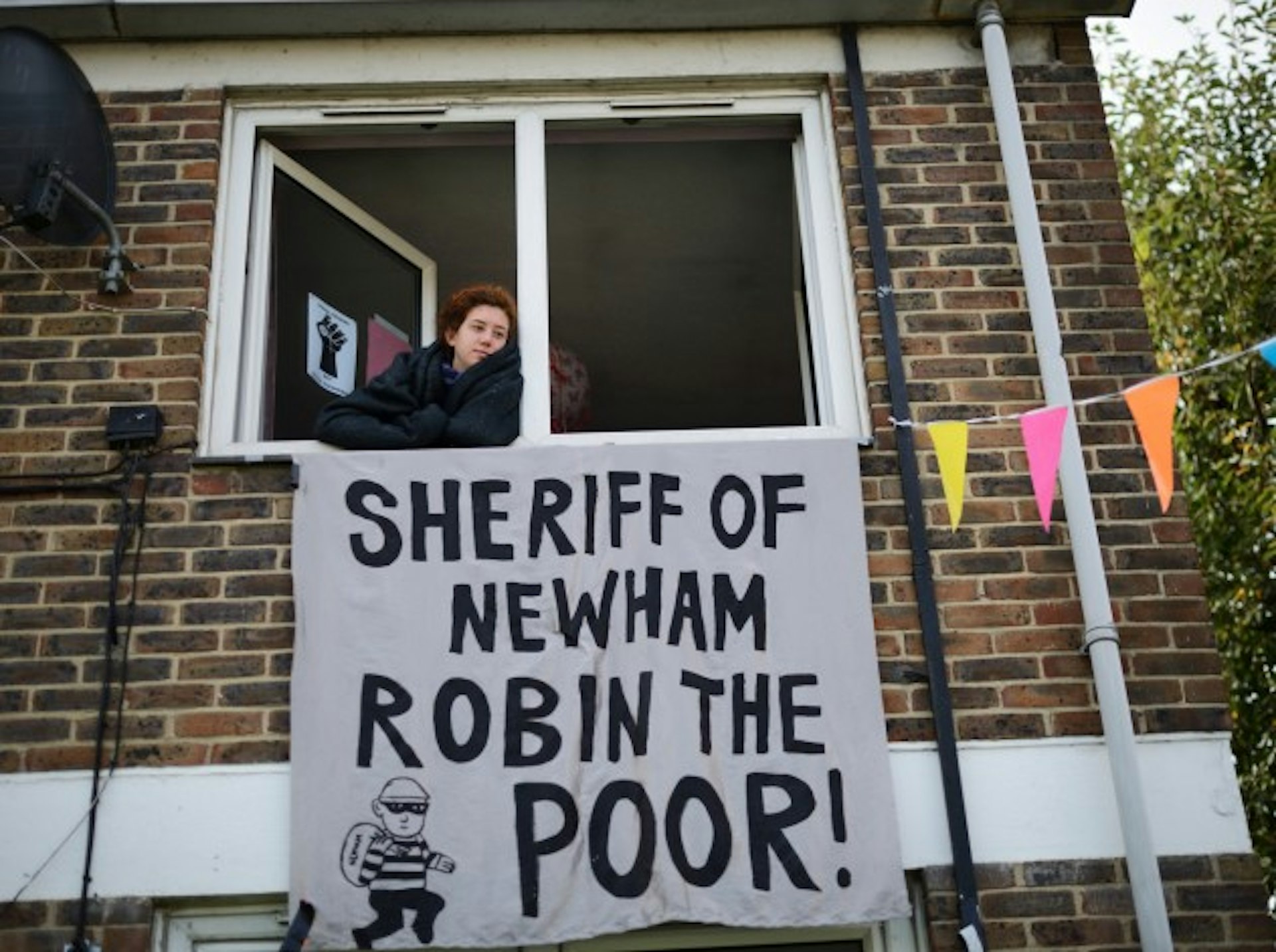
It’s difficult to know whether to feel sorry for Labour mayors who are forced to deal with the mess of Conservative cuts. Even The Economist has described the cuts to social welfare as “savagery”. But then again Wales did wrinkle a few foreheads in 2010 – just as the council was forcing through £28 million in coalition cuts – when Newham spent more than £111 million, or $180 million, on new offices, including more than £10,000 on ostentatious designer chandeliers. In August 2012, the Newham Reporter reported that Sir Robin (knighted by Blair) was on £58,500 a year when he first got the job in 2002, but by the magic power of pay rises he awarded himself £81,029 in 2011.
In defense, the Mayor states he pledged to give this increase to charity. Nevertheless, Sam and Jasmine decided to make him earn every penny. At one point they went down to the Newham Mayor’s show with their own sound system, blaring music and getting lippy on the microphone about the housing crisis.
“His face went all red again,” laughs Sam, showing me a video of the event on her phone. In it, Jasmine can be heard over the microphone. “Affordable housing is not affordable when it’s 80 per cent of the market rate,” she shouts through the mic as a nervous PR man tries to shut her up. “We’ve tried to speak to Robin Wales on many occasions. Come and get involved. Take a leaflet and sign the petition.”
I can see where Sapphire got her mouthy genes.
Sam shakes her head at Robin Wales, who does genuinely seem to have gone bright red as he gesticulates at the girls. “He said he knew exactly who we were and he thought we were disgraceful. Then he said that if us and our families couldn’t afford to live in Newham, then we couldn’t afford to live in Newham – and that was that. Then he smacked a leaflet out of one of our mate’s hands and told us to leave because, ‘It’s a family event.’”
Sam smiles wryly, I’m guessing at Wales’ inability to grasp irony.
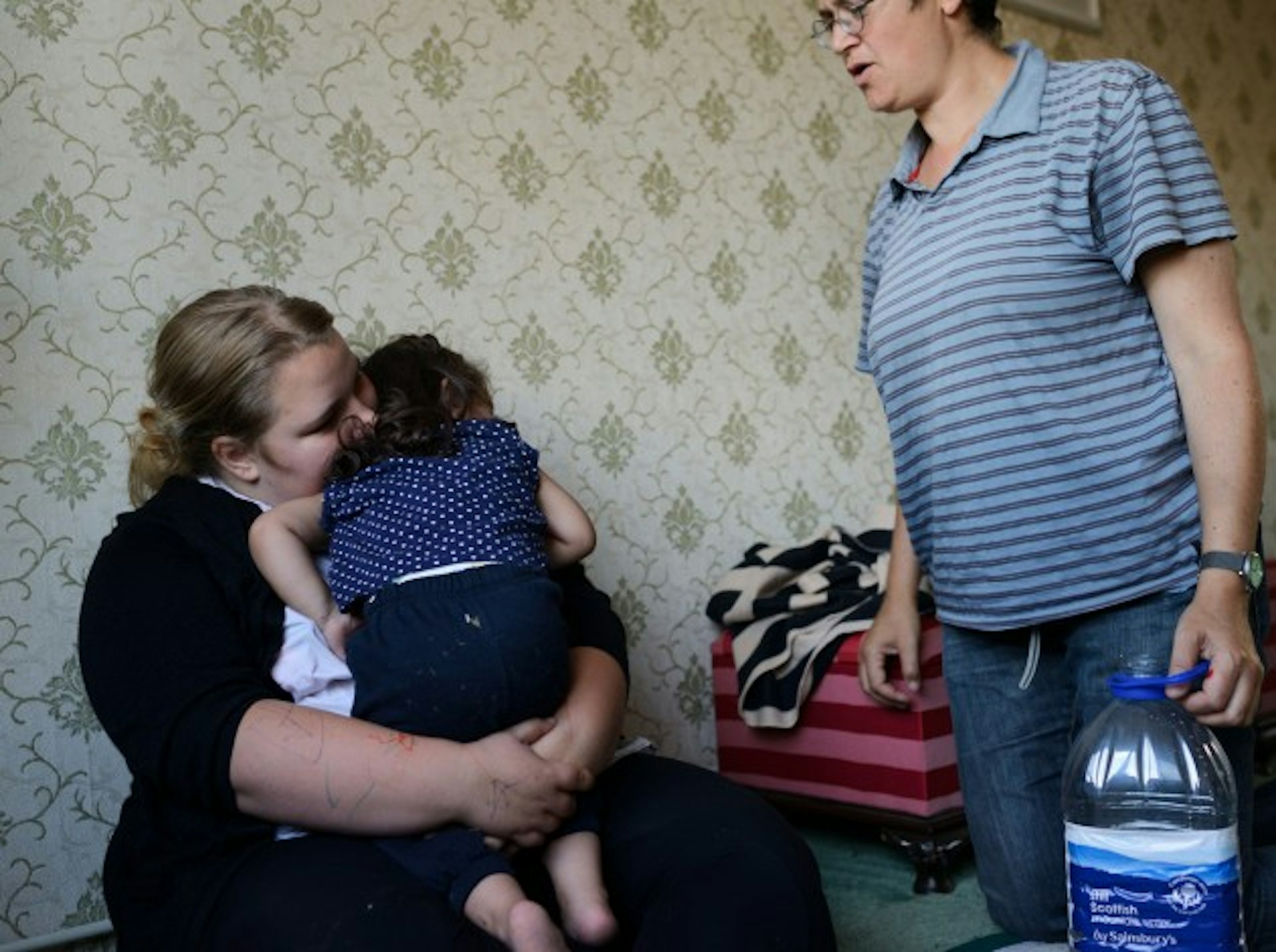
I know a bit about activism. For years I’ve been D-locking myself to stuff, digging up MPs gardens and sneaking into Parliament with secret cameras. I don’t really know how it happened, but these days I actually get paid to do similar stuff for the BBC on a show called The Revolution Will Be Televised. Our show is broken up into three-minute sketches. We go in, take the piss out of plonkers like Bernie Ecclestone, or the EDL, then cut to a new sketch – hopefully making a few of our viewers lol in the process. I’d like to think that what we do on the show makes a difference, but ultimately it’s entertainment. We sit in a swanky office, drinking flat whites and coming up with ideas, which we pitch to commissioners at TV parties over hors d’oeuvres. It’s a sort of hors d’oeuvres activism.
Why am I telling you this? Because here, in the back of this Golf, I’m feeling more inspired by activism than I have in a long time. Sam and Jasmine aren’t hors d’oeuvres activists. They’re genuine heroes, fighting Tory legislation from the trenches with direct action; legislation that has had a direct impact on their lives, and on the lives of many like them.
A report last year from homeless charity Crisis revealed that the number of people sleeping rough has risen by 13 per cent in London alone, and there has been a 10 per cent increase in those housed temporarily.
It’s perhaps telling that homelessness is such a chronic problem in a country so obsessed with home ownership. In the 1980s, Margaret Thatcher gave council tenants the right to buy their houses at knockdown prices in an attempt to ‘liberate’ people from dependence on the state. But she and consecutive governments have never allowed councils to spend the money from those sales on building more social housing.
Since then, successive governments have failed to properly regulate mortgages resulting in a housing bubble that burst in 2008. Now the bubble looks set to return as The Bank of England pushes interest rates down, encouraging banks to offer incredibly cheap mortgages, driving a wave of new buyers into the market and pumping up property prices.
Meanwhile, there are almost 2 million people in this country hoping to secure a state-subsidised home – 24,000 of them in Newham. But – surprise, surprise – there just aren’t enough to go around, forcing many poorer people to rent from private landlords, which the government must subsidise. Private landlords know how inflated the market is and charge rip-off market rates, hence the rocketing housing-benefit budget that the Tories are always moaning about. Their solution? Cut housing benefit – meaning that working people simply cannot afford to live in the neighbourhoods where they grew up.
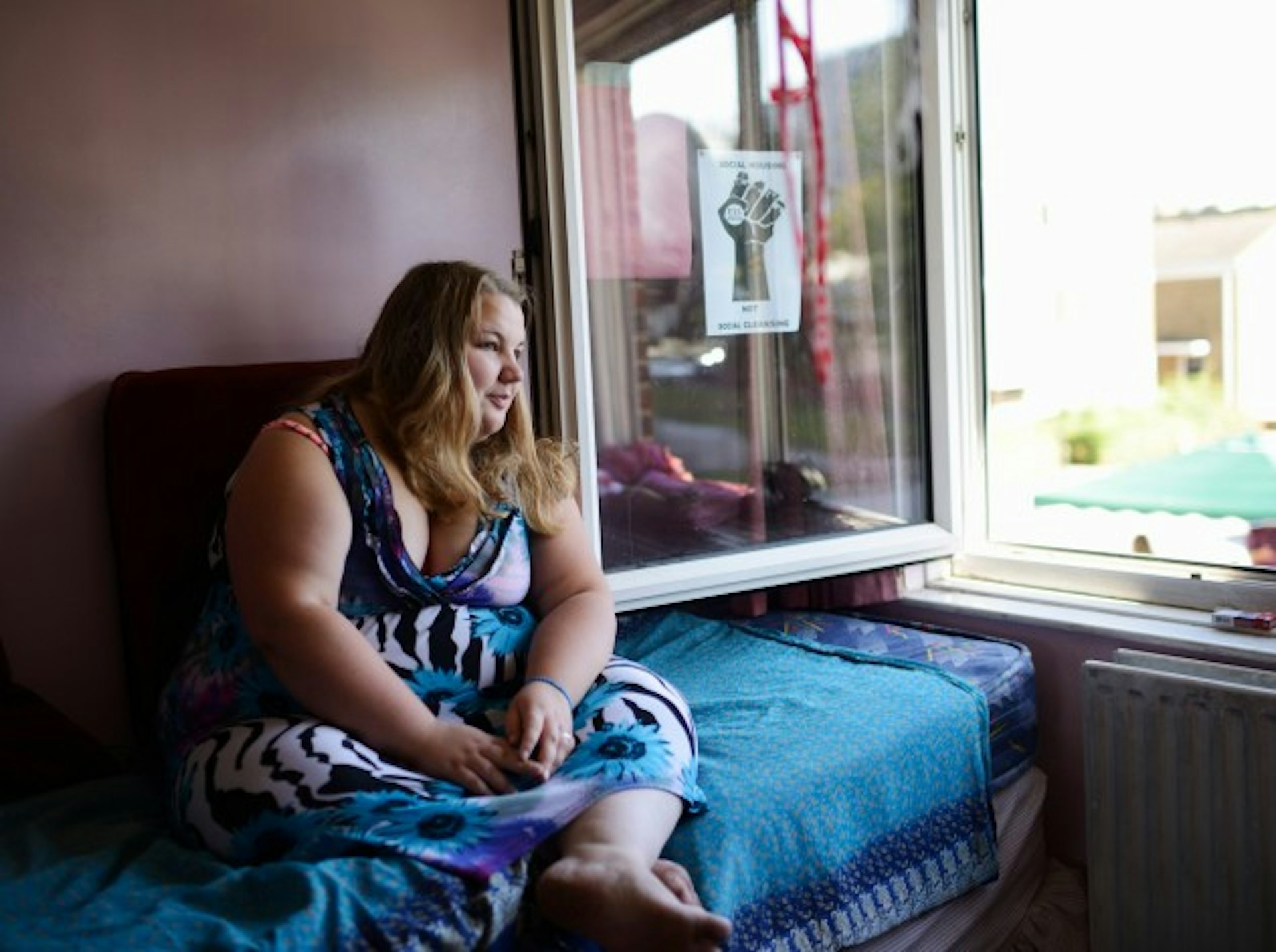
It seems that we’ve forgotten the original function of housing – to provide homes for communities of people. We see houses now as financial opportunities – they’ve become a sort of twenty-first century gold standard, a benchmark for the state of our economy.
Even local councils – struggling for funds due again to government cuts – are eager to cash in despite the effect on local communities. One reason large parts of Carpenters Estate have been vacant for eight years is because of a deal with University College London – which has since fallen through – that would have seen the land given over to a £1 billion campus. Ironic, given that sociologist Ruth Glass was at UCL when she first coined the term ‘gentrification’.
But councils are out of their depth when they swim with savvy property sharks and frequently get crappy deals for their residents. The Heygate Estate in Elephant and Castle was sold by Southwark Council to Australian developer Lend Lease for a mere £50 million in order to turn them into luxury flats. Problem is, Southwark spent £65.4 million on evictions of tenants who began moving out in 2008. The building sat empty for six years before being demolished.
It’s hard to know what drives these deals, but journalist Anna Minton revealed last year, in a report for anti-lobbying organisation Spinwatch, that Tom Branton, Southwark Council’s project manager for the Elephant and Castle Regeneration project until 2011, left the council to work for Lend Lease. Meanwhile Kura Perkins, who was Southwark’s communications manager for the Elephant and Castle project, left the council in 2007 to work as Lend Lease head of communications for the Elephant and Castle project.
Councillors don’t really have a salary and only receive around £10,000 in ‘expenses’. So many of them have jobs outside the council. Minton reveals that almost 20 per cent of Southwark’s sixty-three councillors work on the side as lobbyists, often for companies such as Four Local, founded by former Southwark councillor Steve Lancashire. The company boasts that it ‘has an enviable track-record in securing political and community support for planning applications for developments across London and other regions of the United Kingdom’.
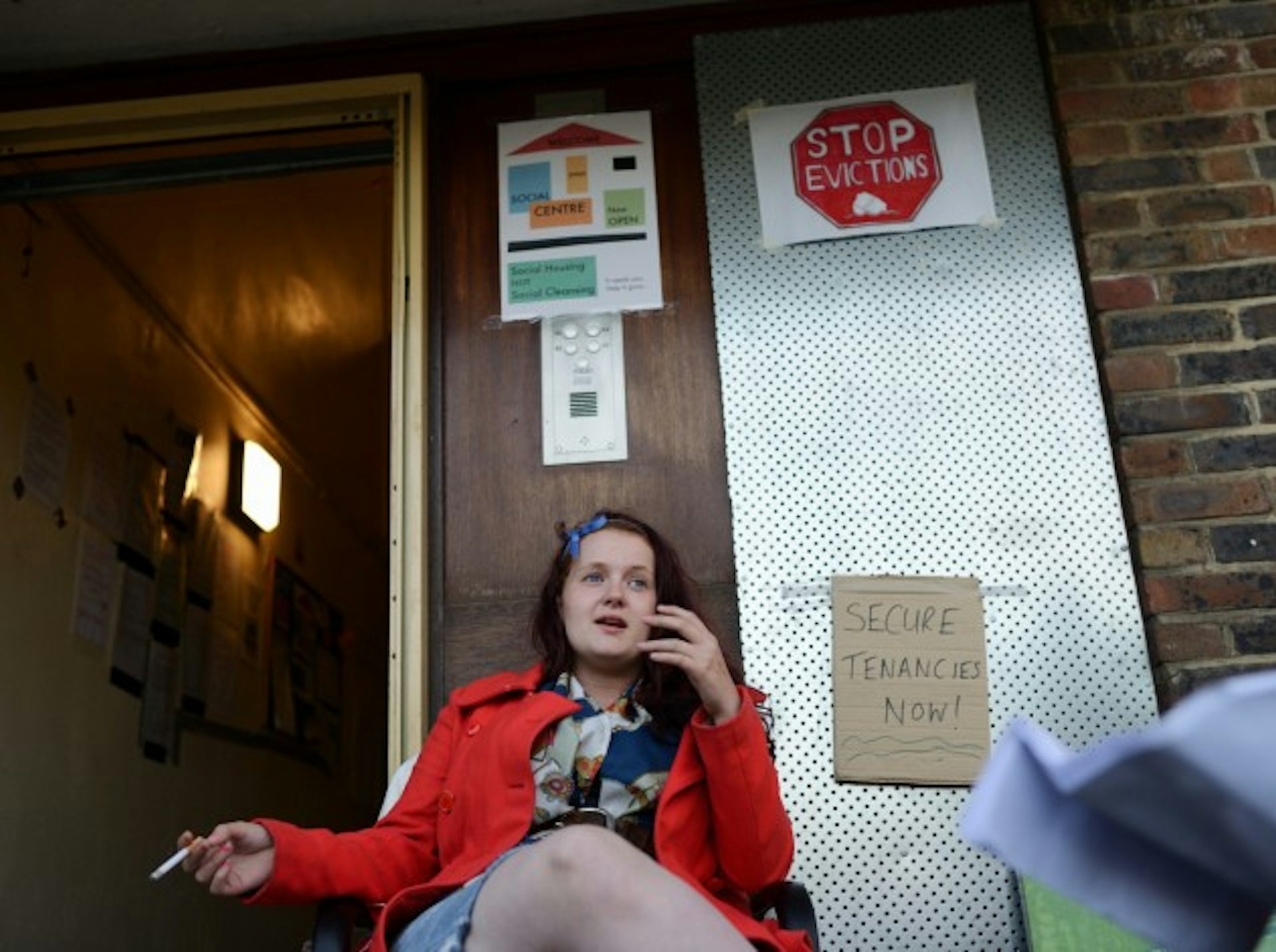
A few years ago I was worried about a huge twenty-five storey block of flats that a developer tried to get planning permission for near my office in Tower Hamlets. I spoke to local residents and they described the bullying tactics of the ‘community consultation and political communications consultancy’ that was tasked by the developer to get planning permission for the block.
Posing as a major developer who was interested in constructing a huge block of luxury flats, I met with the Managing Director along with a Labour councillor who was working as their Head of Client Services, and I secretly recorded the meeting.
The consultants tried to sell me their close relationships with Tower Hamlets councillors telling me that they were frequently speaking to them on the phone or lunching with them and that they could guarantee their support for my fictitious building project. Under Tower Hamlets’ own advice ‘you should not lobby those councillors or seek to meet outside of the framework of [the official planning process], as this may be perceived by the public to be prejudicing the councillors’ impartiality’. The council also advises that councillors shouldn’t have a predetermined decision until they have heard all the evidence for or against a planning application.
The consultancy also boasted of their ability to get Tower Hamlets councillors to tell the planning officers what to do in order to guarantee planning permission for my building saying: “Our job is to get the councillors to tell them [the planning officers] what to do really, and hurry things up.” They talked about how they encourage the planning department to ignore objections from the local community saying, “Nobody gives a ‘bad word’ about what most of the local community think.”
When any major profit-driven housing development is proposed to a council there is normally something called Section 106, which deals with money that should be earmarked for things like affordable housing so as to mitigate the negative effects of gentrification. How this money is spent is supposed to be decided by an independent board to make sure it is spent in a way that most benefits the local community. But the consultant suggested that it was possible to negotiate directly with “one of his [the mayor’s] people” about “how much money there should be for the various things that go up for community use” but that we should keep it “one stage removed”.
I asked him what he meant. And he proceeded to clarify how things tend to work: “Well, rather than me sitting down with the mayor, ’cause the mayor will say I can’t be seen with you or directly with these people, so he sends one of his people, and then I speak to the client of ours, and everything goes round like that, really.”
Developers are naturally keen to reduce the amount of affordable housing they have to build through Section 106, because it means they have less upmarket flats to sell. The minimum is normally 35 per cent. I asked about how much affordable housing was allocated to another proposed development of flats, brokered by a different agency. He reassured us that there is always room for negotiation: “I’ll tell you exactly what they did, they got planning permission with it on site and they came back to renegotiate and that changed some of the unit sizes… The first schemes that are less than 35 per cent are beginning to go to committee in the next couple of months.”
How much of the agency’s claims were bluster in an attempt to secure my imaginary custom is hard to say, but it strikes me as a fascinating example of the all-engulfing tsunami of greed that is driving the housing agenda. The political machine that pushes through these planning decisions is oiled by the kind of insider conversations that people facing eviction have no access to. And Jasmine and Sam’s story is just one example of the families who have had to deal with the arse-end of this scandal. Jasmine and Sam, however, stood up, took action and not only that – they won.
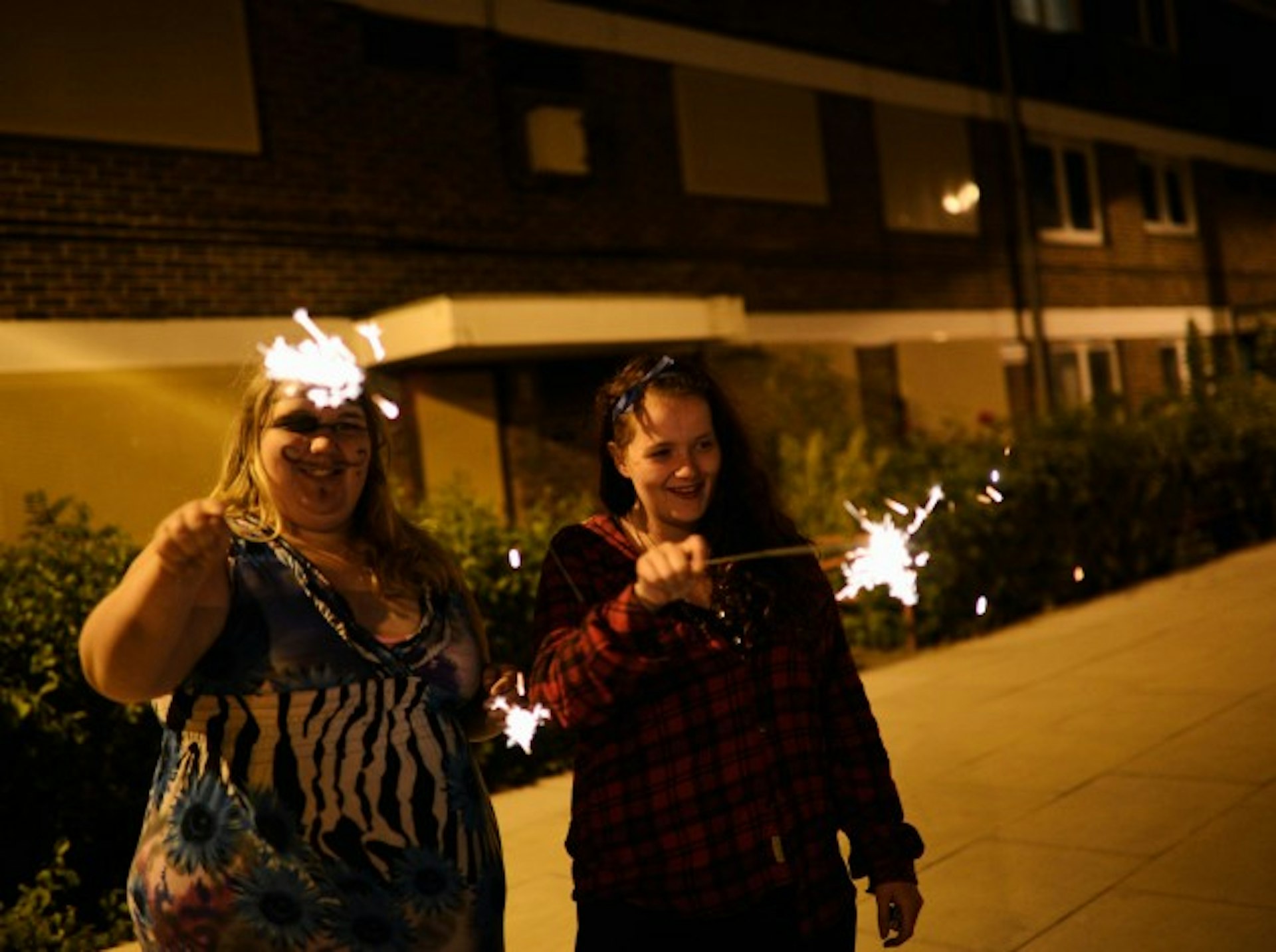
On October 2, 2014, Jasmine and Sam left a court hearing to cheers from the gathered crowd. Although they ultimately had to leave the Carpenters Estate, they succeeded in getting Robin Wales to apologise and admit they had been mistreated. In a statement, Robin Wales said that the borough was “coping with the realities of this government’s housing crisis, caused by a shortage of affordable homes and a barbaric approach to welfare cuts for the most vulnerable.” But that wasn’t their only success. They also secured a pledge from the council to house forty families in the empty homes on Carpenters. And they used the occupation to galvanise an entire community of activists who fought back against local evictions of other young mothers in similar situations. On top of that, they sparked a national debate in the press and drew in celebrity champions such as Russell Brand (who was on the estate almost every time I showed up – hanging out, making people tea and flirting with the mums).
Jasmine and Sam have a chant they like to scream whenever they pay Robin Wales a visit. It goes, “Social housing not social cleansing.” It might sound an extreme interpretation, but for many people that’s precisely what’s happening in our capital city.
For Conservatives like Iain Duncan Smith, these “sensible” reforms to our benefit system – which manifest as cuts and evictions – will only serve to “make Britain great again”.
Try explaining that to fourteen-year-old Saffron, still squashed in the back of the Golf between me and Sapphire, who’s now chucking around her chips.
Currently in foster care, Saffron has become a permanent fixture in the squat – helping out with activities and using her mouthiness to great effect at rallies. Before that she was living with her mum along with five other kids in a two-bedroom flat. When her mum had her benefits cut and struggled to pay the rent, the family was evicted. They had to pack and leave within four days. So, they did. They were given a choice of a house in Hastings or a bed and breakfast in London. Her mother didn’t want to take the kids to a strange city and enroll them in new schools.
But social workers warned her against taking the more expensive option of staying in London; if she couldn’t make rent and became homeless, she would have her kids taken into care. It’s a sad, sad story of Catch 22 that sums up the human toll of benefit cuts.
Jasmine and Sam didn’t do all of this for their own ends, clearly. Even before they occupied the Carpenters Estate, their actions had already pressurised the council into giving them accommodation in London. It’s by no means a perfect solution. Jasmine, for instance, is paying £950 a month right now for her place in Stratford. That’s what is now seen as affordable accommodation. Ironically, it won’t be affordable at all when she returns to work in a nearby nursery and loses her benefits. But Sam and Jasmine are doing this to win the war – not the battle. And they’re doing it for the next generation like Saffron.
“They don’t care about us here in Newham,” says Saffron. “We wouldn’t have nothing if people like Sam and Jasmine didn’t go out and do what they do.”
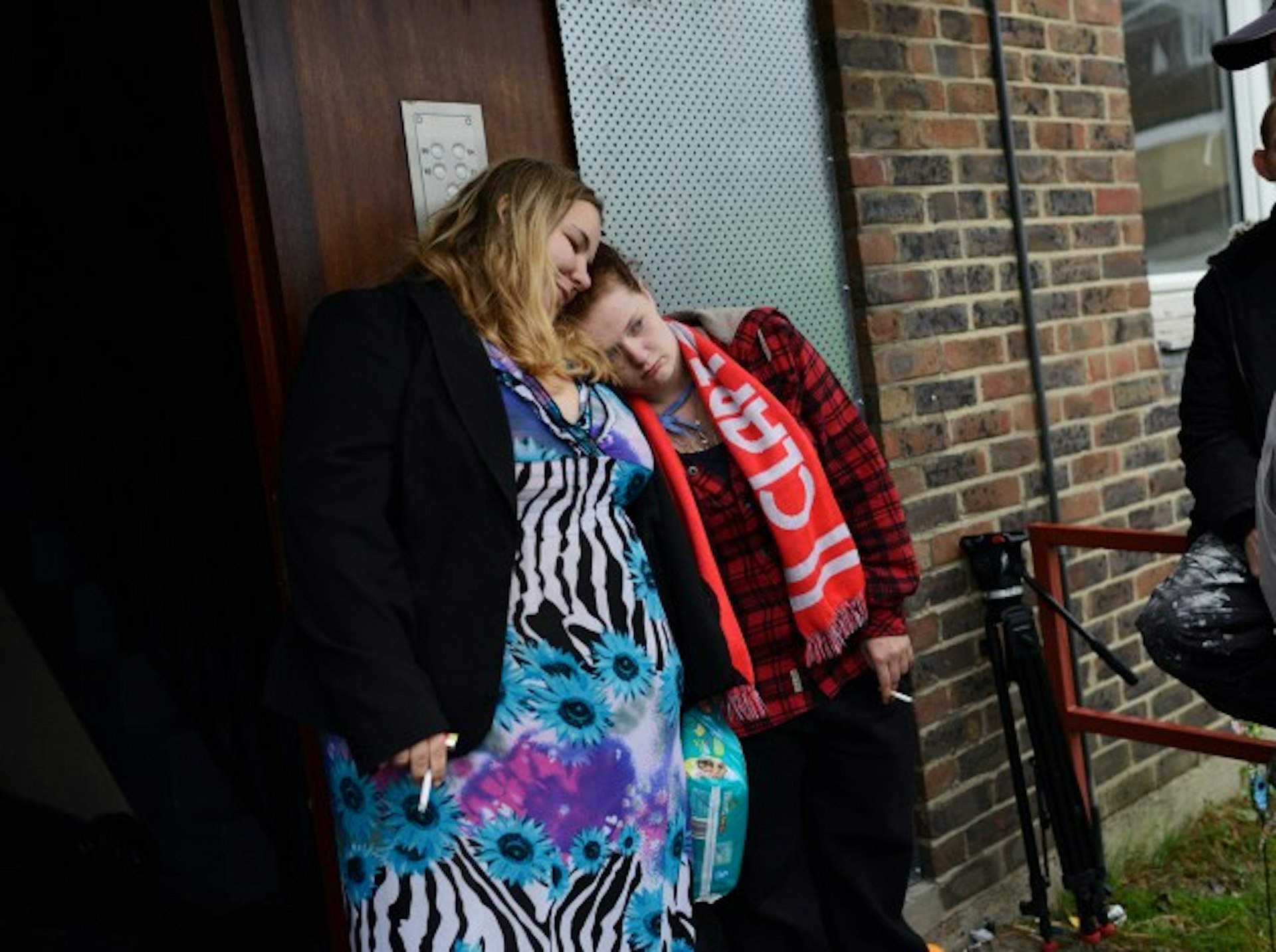
I tend to agree. It feels like London is fast becoming some sort of Elysium – the garden city paradise in the sky that the rich elites move to in the futuristic Matt Damon film of the same name. Imagine how gutting it must be to face eviction from the city you grew up in, only to walk through Kensington and Chelsea and see all those houses lying empty, bought by Russian oligarchs and Qatari princes as investments not homes.
But this isn’t only a moral issue. Elysium is boring. When Matt Damon eventually gets up there it’s bloody suburbia. It’s like earth got all the fun and diversity of life and Elysium got all the well-kept lawns. It’s where you go to retire.
I grew up in Islington, which fell victim to Thatcher’s right to buy scheme in the 1980s. All the locals who grew up in the area sold up to the yuppies, like my parents, and moved to Ruislip. So Islington became home to a class of transient bankers and lawyers and, pretty soon after, it got boring. East London, where I live now, is fast becoming Elysium too as council blocks like the New Era estate in Hoxton are bought up by multi-millionaire Tory MPs like Richard Benyon who introduce ‘market rates’ that force out residents who have been there for more than seventy years.
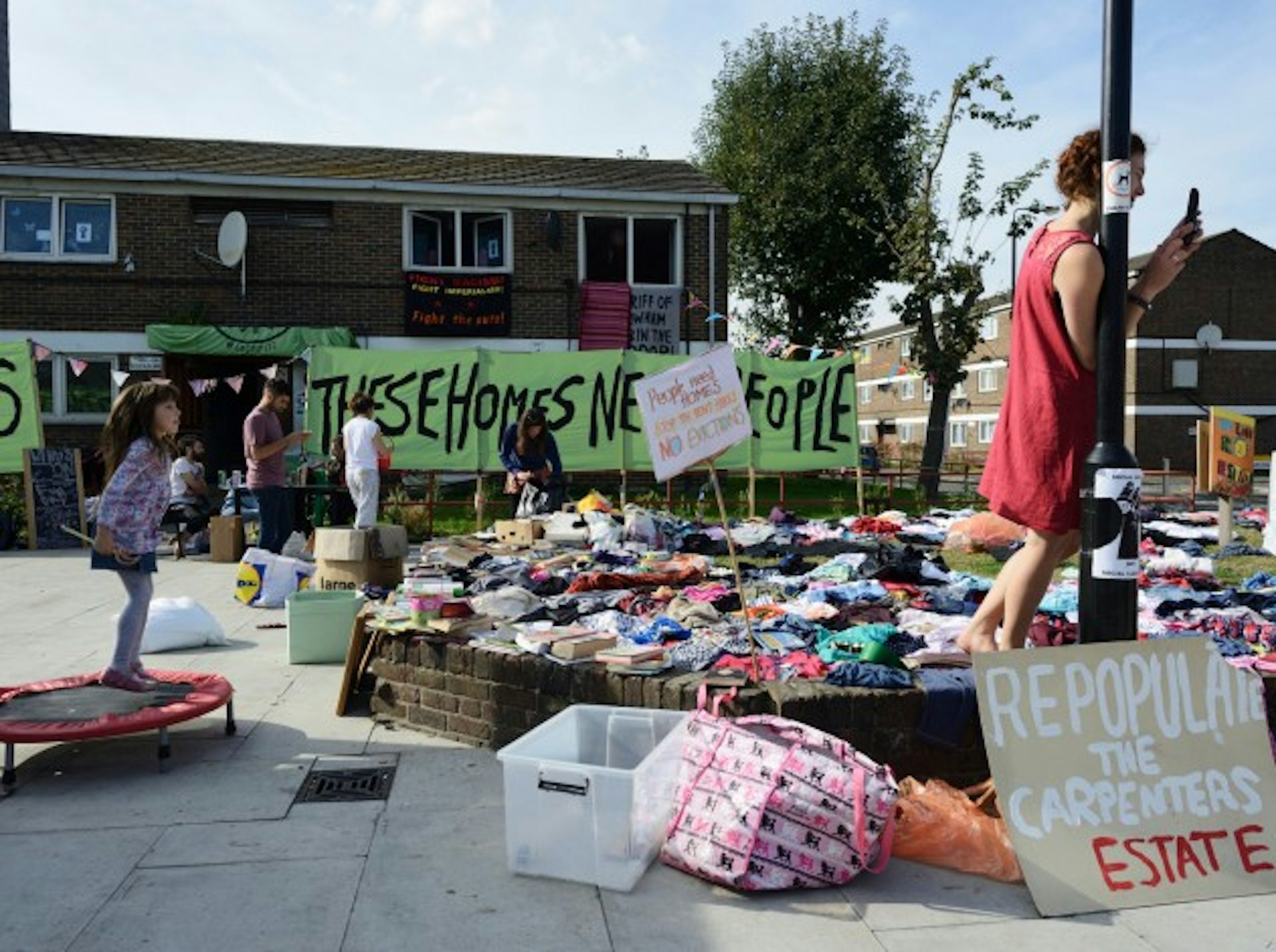
I wonder how long it will take for Newham to become Elysium too as we arrive back at the squat. The girls are busy showing everyone their fireworks, which the local fire brigade have agreed to let off at their farewell party. There is a ‘Free Shop’ on the lawn outside with lots of clothes, toys, DVDs and stuff that people can take away. Someone has made food and there is face painting – an activity I unwillingly get roped into by Saffron who turns me into a kind of post-apocalyptic clown. Later that night the party will start and the occupation will be over.
I try to imagine what this council estate looked like before these women moved in – before they ushered in dozens of like-minded new friends and rolled up their sleeves to give the walls a fresh lick of paint. It was dead. They have breathed life into it. And even if it was only for a moment, what they achieved can’t be brushed aside. On the hall just inside the front door of the squat, someone has put up a map of all the vacant council estates in London. Let’s hope Sam and Jasmine’s story inspires other people being kicked out of their homes to go forth and Occupy.
Add to the conversation: @heydonprowse / @huckmagazine
Support the Focus E15 Mothers’ campaign by signing the petition on Change.org and voicing your concerns in a letter to Mayor of Newham Robin Wales.
Keep up to date with the Focus E15 Mothers campaign over on their Facebook page.
